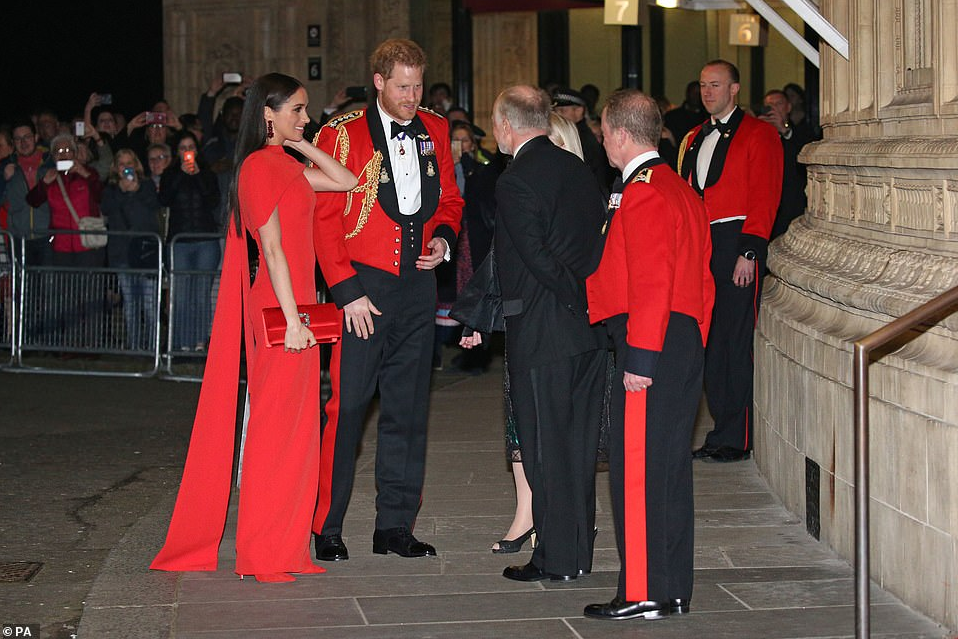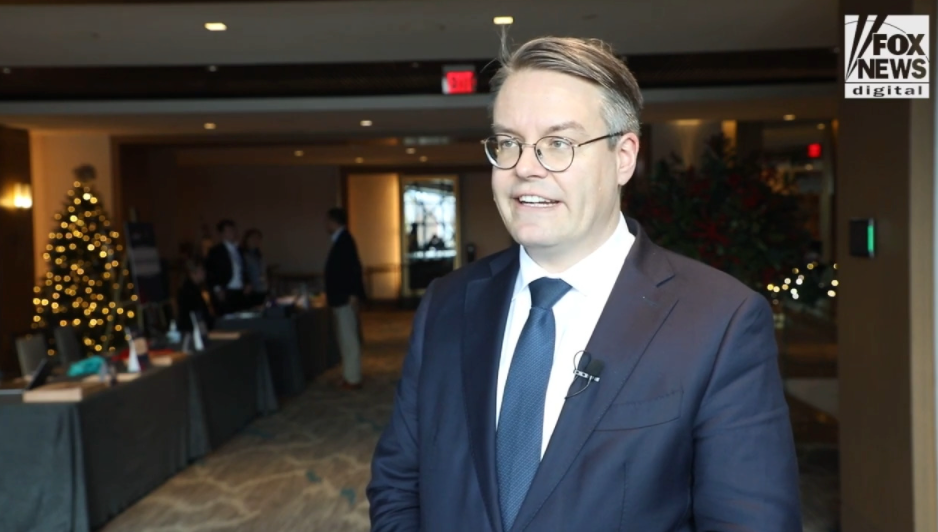Russia-Ukraine war live: Ukrainian troops begin counter-offensive in south, says military command | Ukraine
Ukrainian troops begin counter-offensive in Kherson region, says military command
Ukraine has started a long-awaited counter-offensive in the country’s south, its southern military command has announced, amid reports that Ukrainian troops were able to break through Russian lines in the Kherson region.
Ukraine’s southern command spokesperson, Natalia Humeniuk, was cited by Ukrainian public broadcaster Suspilne as saying:
Today we started offensive actions in various directions, including in the Kherson region.
She declined to provide more details about the new offensive but said Ukraine’s recent strikes on Russia’s southern logistical routes had “unquestionably weakened the enemy”.
More than 10 Russian ammunition dumps had been hit over the last week, Humeniuk added.
Humeniuk’s comments came after reports from Ukrainian newspapers that units of Ukraine’s defence forces had last night launched a counteroffensive on the right bank of the Dnipro river in Kherson Oblast.
Soldiers deployed on the front lines have reportedly said they managed to break through the first line of Russian defence in the region.
The Guardian has not been able to verify these reports.
Key events

Dan Sabbagh
Nadiia Vorobei is giving a tour of her ruined, green-walled home on a rainy afternoon in the village of Andriivka, 30 miles west of Kyiv.
The 66-year-old says that in March she was “literally carried out of the house” by Russian soldiers so they could forcibly billet themselves within it. Two weeks later, on 18 March, the property was devastated in the fighting.
She says it burned out in 20 minutes after an explosion while she looked on from her neighbours’ house next door. The destruction of the home her parents had built was painful to watch, she says.
Since then, Vorobei says, she has had no help from Ukraine’s authorities. A couple of friends are trying to rebuild her garage in time for winter, but she has no money to pay for further help. Her pension is 2,500 hryvnia (about £57) a month, enough to cover basic living costs and no more.
Volunteers donated a small shipping container in April, where Vorobei lives at the rear of the property. It is tiny, the length of a single bed, with chipboard walls and electricity but no water or gas. Possessions are piled high in the little space available. “I call it a doghouse,” she says.
Five months after the Russians were forced out of the towns and villages north-west of Kyiv, it is clear that reconstruction and recovery is at best slow and at worst nonexistent.
Read the full story by Dan Sabbagh and Artem Mazhulin: ‘I call it the doghouse’: slow progress on rebuilding ruined homes near Kyiv
Ukraine’s president, Volodymyr Zelenskiy, has accused Russia of economic terrorism as the cost of Europe’s energy crisis spiralled, Reuters reported.
“Russia is using economic terror,” Zelenskiy told an energy industry conference in the Norwegian city of Stavanger.
“It is exerting pressure with price crisis, with poverty, to weaken Europe,” Zelenskiy told the audience via a translator.
Another multinational has announced its intentions to wind down its remaining operations in Russia, Reuters has reported.
Computer accessories giant Logitech International said on Monday it would wind down its remaining operations in Russia due to the “ongoing uncertain environment”, joining other major technology and telecoms businesses to announce plans for a complete exit.
“In March, we communicated that Logitech would stop shipments to Russia,” Logitech said in a statement. “We have monitored the situation closely and regrettably, the circumstances do not allow for us to continue to do business as before.”
Several killed in Russian shelling of Mykolaiv, says governor
A number of civilians have been killed after Russian shelling of private homes in Mykolaiv, according to the regional governor, Vitaliy Kim.
Writing on Telegram, Kim said:
The centre of the city is being heavily shelled. There are still rockets being launched. Do not leave shelters.
Powerful explosions have been reported today in Mykolaiv. as well as in the Russian-occupied Kherson, with residents urged to stay in shelters. The Guardian has not been able to verify the regional governor’s report.
In Mykolaiv and temporarily occupied Kherson, powerful explosions were heard, the local population was urged to take cover.
— Iuliia Mendel (@IuliiaMendel) August 29, 2022
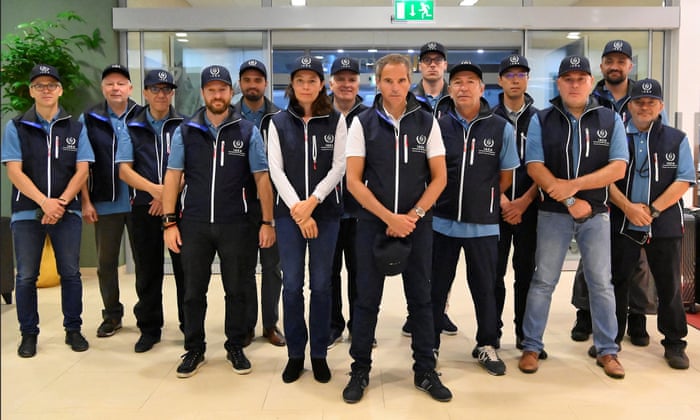
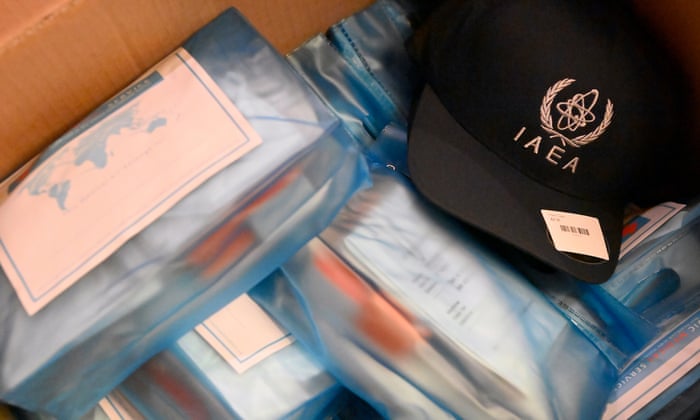
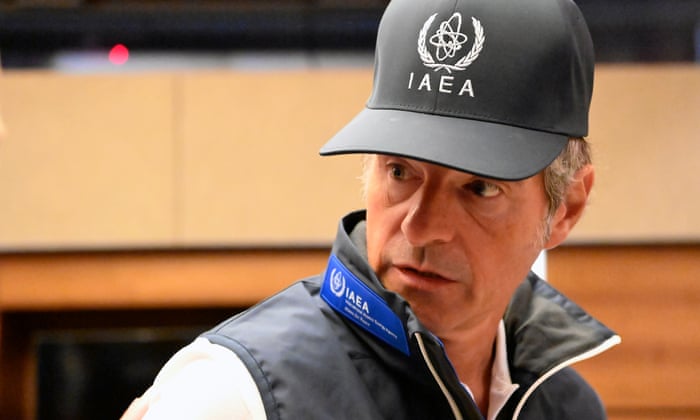
US believes Ukraine ‘shaping’ for counteroffensive in the south, say officials
Here’s more on the reports that Ukraine’s forces have started a long-awaited counter-offensive in the country’s south.
The US believes that Kyiv’s troops have begun “shaping” operations in the south of the country to prepare for a significant Ukrainian counter-offensive, CNN reports.
According to two senior US officials, the US believes the counter-offensive will include a combination of air and ground operations.
Shaping operations are standard military practice prior to an offensive, and usually involve striking weapons systems, command and control, ammunition depots and other targets to prepare the battlefield for planned advances.
Ukrainian troops begin counter-offensive in Kherson region, says military command
Ukraine has started a long-awaited counter-offensive in the country’s south, its southern military command has announced, amid reports that Ukrainian troops were able to break through Russian lines in the Kherson region.
Ukraine’s southern command spokesperson, Natalia Humeniuk, was cited by Ukrainian public broadcaster Suspilne as saying:
Today we started offensive actions in various directions, including in the Kherson region.
She declined to provide more details about the new offensive but said Ukraine’s recent strikes on Russia’s southern logistical routes had “unquestionably weakened the enemy”.
More than 10 Russian ammunition dumps had been hit over the last week, Humeniuk added.
Humeniuk’s comments came after reports from Ukrainian newspapers that units of Ukraine’s defence forces had last night launched a counteroffensive on the right bank of the Dnipro river in Kherson Oblast.
Soldiers deployed on the front lines have reportedly said they managed to break through the first line of Russian defence in the region.
The Guardian has not been able to verify these reports.
Ukraine’s foreign minister, Dmytro Kuleba, has warned that the UN nuclear watchdog’s mission to the Russian-occupied Zaporizhzhia nuclear plant in Ukraine will be the “hardest in the history” of the agency.
Russia “is putting not only Ukraine but also the entire world at threat of risk of a nuclear accident”, Kuleba said during a visit to Stockholm.
Kuleba said:
This mission will be the hardest in the history of the IAEA, given the active combat activities undertaken by the Russian Federation on the ground and also the very blatant way that Russia is trying to legitimise its presence.
He also demanded Russia leave the nuclear plant, adding:
Russia must go and the IAEA as well as many countries of the world, we have to make them go, it’s as simple as that. This is the only way to ensure nuclear security.
For decades, nuclear safety has remained Ukraine’s top priority, especially given our tragic past. Russian invaders turned Zaporizhzhya NPP into a military base putting the entire continent at risk. Russian military must get out of the plant — they have nothing to do there!
— Dmytro Kuleba (@DmytroKuleba) August 28, 2022
Russia says it ‘welcomes’ UN visit to Zaporizhzhia nuclear plant
Moscow has said it welcomes a visit by the UN nuclear watchdog to the Russian-held Zaporizhzhia nuclear power plant in south-east Ukraine.
The International Atomic Energy Agency (IAEA) confirmed earlier today that it would inspect the Zaporizhzhia – Europe’s largest nuclear plant – this week and that a team was en route to the facility.
The mission will assess any physical damage to the plant, determine the functionality of safety and security systems, evaluate staff conditions and perform urgent safeguards activities, it said.
A top Russian diplomat said Moscow hoped the IAEA visit would dispel misconceptions about the plant’s allegedly poor state, according to the Russian state-owned news agency Ria.
Mikhail Ulyanov, Russia’s permanent representative to the international organisations in Vienna, was quoted by Ria as saying that his country had worked hard to help make the visit possible and understood that the IAEA wanted to leave several representatives at the plant on a permanent basis.
Ulyanov was cited as saying:
As far as we understand, it is the director general’s intention to leave several people at the station on a permanent basis.
He added:
Russia has made a significant contribution to the preparation of this mission. We hope that the visit of the plant by the IAEA mission will dispel numerous speculations about the unfavorable state of affairs at the Zaporizhzhia nuclear power plant.
Meanwhile, the Kremlin accused Ukraine of “exposing the European continent to danger” ahead of the IAEA visit to the Zaporizhzhia plant.
The Kremlin spokesperson, Dmitry Peskov, said Moscow welcomed the upcoming mission and was ready to cooperate with the IAEA.
But he added that Russia was not considering the possibility of creating a demilitarised zone at the plant.
Russia and Ukraine have accused each other of shelling in the plant’s vicinity in recent weeks, while denying the claims themselves.
Hello everyone. I’m Léonie Chao-Fong and I’ll be bringing you all the latest developments from the war in Ukraine. Feel free to drop me a message if you have anything to flag, you can reach me on Twitter or via email.
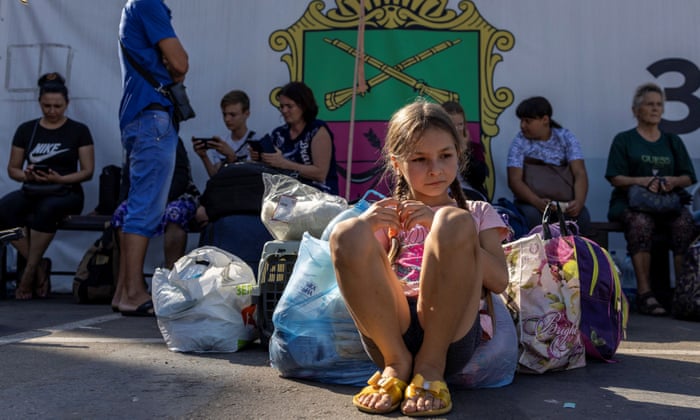
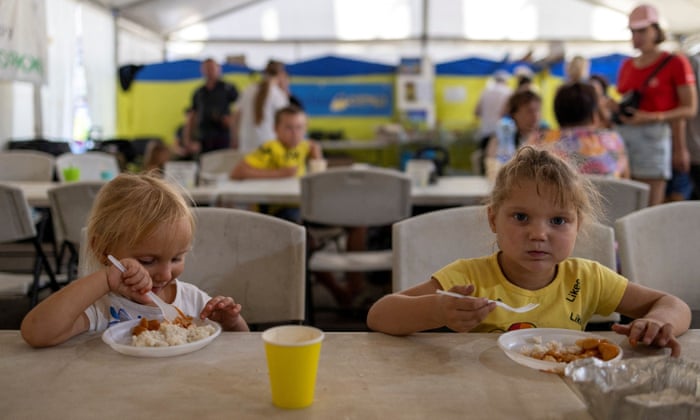
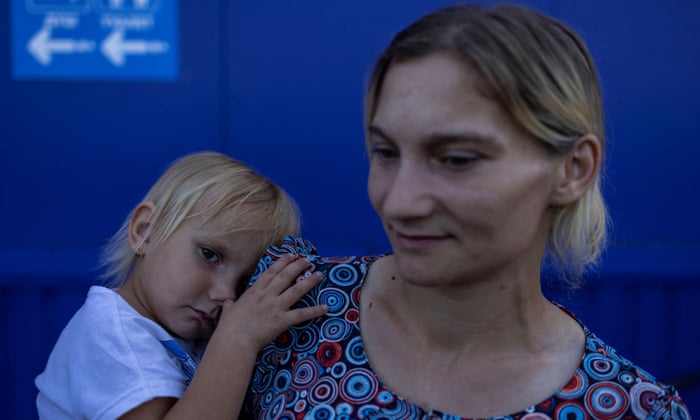
Summary
It is just after 1pm in Ukraine. Here is what you may have missed:
-
The UN nuclear watchdog will visit Ukraine’s Zaporizhzhia nuclear power plant this week, its director general has said. International Atomic Energy Agency (IAEA) chief, Rafael Grossi, tweeted confirmation of the visit early on Monday. The mission will assess any physical damage to the plant, determine the functionality of safety and security systems, evaluate staff conditions and perform urgent safeguards activities.
-
Russia’s defence minister Sergei Shoigu is being “sidelined” due to problems in the war against Ukraine and is likely being ridiculed by soldiers for his “ineffectual” leadership, said British intelligence. The latest update from the Ministry of Defence (MoD) that Shoigu has probably “struggled” to overcome his reputation as not having much military experience.
-
Russia’s FSB security service today named another Ukrainian it said was part of a team that assassinated Darya Dugina. Dugina, the daughter of ultra-nationalist Alexander Dugin was killed in a car bombing outside Moscow on 20 August. Two days after the 29-year-old’s murder, the FSB said it had solved the case, naming a Ukrainian woman it said had trailed Dugina for weeks, rented an apartment in her housing complex and planted the car bomb before fleeing Russia to Estonia – all with Kyiv’s backing. The FSB said it had now identified what it called another member of a Ukrainian “sabotage and terrorist group” which it said had plotted and carried out the killing, reports Reuters.
-
Ericsson said it will gradually wind down business activities in Russia over the coming months. The company, which suspended its business in Russia indefinitely in April, said it has about 400 employees in Russia and would provide financial support to affected employees, reports Reuters. Dell Technologies Inc said on Saturday it had ceased all Russian operations after closing its offices in mid-August.
-
New Zealand’s prime minister, Jacinda Ardern, has admitted the body of a New Zealand soldier who died defending Ukraine may never be returned home. Corporal Dominic Abelen, 28, was on leave without pay when he travelled to Ukraine to fight in the war against defence force rules and without telling his family. Foreign minister Nanaia Mahuta has stressed New Zealand is treating the case of Abelen as a citizen rather than a soldier, though there are calls to bring Abelen’s remains home. Ardern said questions of how to treat Abelen were secondary to practical ones during a string of radio and media appearances on Monday morning.
-
European Union defence and foreign ministers will meet in Prague this week to discuss options for setting up a military training mission for Ukrainian forces and also look into calls by some members to ban Russian tourists from entering the bloc, reports Reuters. The bloc’s foreign policy and security chief, Josep Borrell, has given few details of his plans so far, merely stating such a military training programme would not be based in Ukraine but in neighbouring countries. In meetings on Monday and Tuesday this week, officials will also discuss a proposed visa ban for Russians.
-
Russian forces are “reconstructing” the Mariupol theatre to cover war crimes, according to an adviser to the city’s mayor. Petr Andriushchenko said Moscow’s forces are rebuilding the theatre under the guise of reconstruction for “historical value”.
-
Volodymyr Zelenskiy, Ukraine’s president, held a meeting with representatives of Ukraine’s defence and security sectors on Sunday. “All the issues we considered are important, but secret, I cannot go into detail,” he said. The meeting was attended by the heads of the armed forces, intelligence agencies, the ministry of defence, the ministry of internal affairs, the Ukrainian security service as well as other defence forces.
-
Russian artillery fired at Ukrainian towns across the river from the Zaporizhzhia nuclear power plant, local officials said on Sunday. The regional governor, Oleksandr Starukh, said Russian forces struck residential buildings in the main city of Zaporizhzhia and the town of Orikhiv farther east. Ukraine’s military reported shelling of nine more towns in the area on the opposite side of the Dnieper river from the plant.
-
The US has said Russia does not want to acknowledge the grave radiological risk at Ukraine’s Zaporizhzhia nuclear power plant, adding that was the reason it blocked a nuclear non-proliferation treaty deal’s final draft. “The Russian Federation alone decided to block consensus on a final document at the conclusion of the Tenth Review Conference of the Nuclear Non-Proliferation Treaty (NPT). Russia did so in order to block language that merely acknowledged the grave radiological risk at the Zaporizhzhia Nuclear Power Plant in Ukraine,” said a US state department statement.
-
Concern about the potential risk of radiation leaks at the plant persists. Ukrainian and Russian authorities issued fresh warnings about the risk of radioactive leaks, after shelling that the sides blamed on each other. Ukraine’s state energy operator warned there are “risks of hydrogen leakage and sputtering of radioactive substances”. Russia has ignored widespread international calls for the area to be demilitarised.
-
Ukrainians are likely to experience their coldest winter in decades, its gas chief has said, as the thermostats on its Soviet-era centralised heating systems are set to be switched on later and turned down. Yurii Vitrenko, the head of the state gas company Naftogaz, said indoor temperatures would be set at between 17-18C, about four degrees lower than normal, and he advised people to stock up on blankets and warm clothes for when outdoor temperatures fall to and beyond the -10C winter average.
-
Germany is replenishing its gas stocks more quickly than expected despite drastic Russian supply cuts and should meet an October target early, the government has said. Europe’s largest economy is heavily dependent on Russian gas and has raced to bolster its reserves before winter, crediting energy-saving measures in recent weeks and massive purchases of gas from other suppliers.
-
EU foreign ministers are expected to suspend Russian tourist visa facilitation next week. The EU move falls short of an outright ban but would make getting travel documents significantly more complicated and expensive. The EU foreign policy chief, Josep Borrell, said a ban would lack the necessary support. “I don’t think that to cut the relationship with the Russian civilian population will help and I don’t think that this idea will have the required unanimity,” he told Austria’s ORF TV on Sunday.
Russia names second suspect in Dugina murder
Russia’s FSB security service today named another Ukrainian it said was part of a team that assassinated Darya Dugina.
Dugina, the daughter of ultra-nationalist Alexander Dugin, was killed in a car bombing outside Moscow on 20 August.
Two days after the 29-year-old’s murder, the FSB said it had solved the case, naming a Ukrainian woman it said had trailed Dugina for weeks, rented an apartment in her housing complex and planted the car bomb before fleeing Russia to Estonia – all with Kyiv’s backing.
Ukraine has denied involvement in the murder of Dugina.
The FSB said it had now identified what it called another member of a Ukrainian “sabotage and terrorist group” which it said had plotted and carried out the killing, reports Reuters.
It said in a statement that the new suspect, a man born in 1978 who it named and showed CCTV footage of, had helped assemble the car bomb in a rented garage in Moscow and had secured fake documents and number plates for the woman who had planted the bomb on Dugina’s car.
The man had exited Russia via Estonia a day before the attack, it said.
In an 11-minute video released by the FSB, CCTV footage showed the man entering Russia on 30 July, entering and exiting a garage complex in Moscow, collecting what the FSB said were fake number plates, and exiting Russia in the early hours of 19 August, the day before Dugina was killed.
Shoigu being ‘sidelined’ and ridiculed for ‘ineffectual’ leadership, says MoD
Russia’s defence minister Sergei Shoigu is being “sidelined” due to problems in the war against Ukraine and is likely being ridiculed by soldiers for his “ineffectual” leadership, said British intelligence.
The latest update from the Ministry of Defence (MoD) said:
Recent independent Russian media reports have claimed that due to the problems Russia is facing in its war against Ukraine, Russian defence minister Sergei Shoigu is now being sidelined within the Russian leadership, with operational commanders briefing President Putin directly on the course of the war.
Russian officers and soldiers with first-hand experience of the war probably routinely ridicule Shoigu for his ineffectual and out-of-touch leadership as Russian progress has stalled.
The update added that Shoigu has probably “struggled” to overcome his reputation as not having much military experience.
Ericsson said today it will gradually wind down business activities in Russia over the coming months.
The company, which suspended its business in Russia indefinitely in April, said it had about 400 employees in Russia and would provide financial support to affected employees, reports Reuters.
A number of western companies are selling their Russian businesses after announcing suspensions of operations in the weeks after Moscow invaded Ukraine in February.
Dell Technologies Inc said on Saturday it had ceased all Russian operations after closing its offices in mid-August.
Its Finnish rival Nokia had already announced its decision to pull out of Russia, impacting about 2,000 employees.
The Finnish company did not respond to a request for comment on when the exit will complete.
The G7 today welcomed a trip by the UN nuclear watchdog to Ukraine‘s Zaporizhzhia nuclear plant and reiterated concerns about the safety of the plant under the control of Russian armed forces.
In a statement reported by Reuters, it said:
We reaffirm that the Zaporizhzhya nuclear power plant and the electricity that it produces rightly belong to Ukraine and stress that attempts by Russia to disconnect the plant from the Ukrainian power grid would be unacceptable.
As we reported earlier a team from the UN nuclear watchdog said it was on its way to the plant that was captured by Russian troops in March but run by Ukrainian staff, and will reach it later this week.


